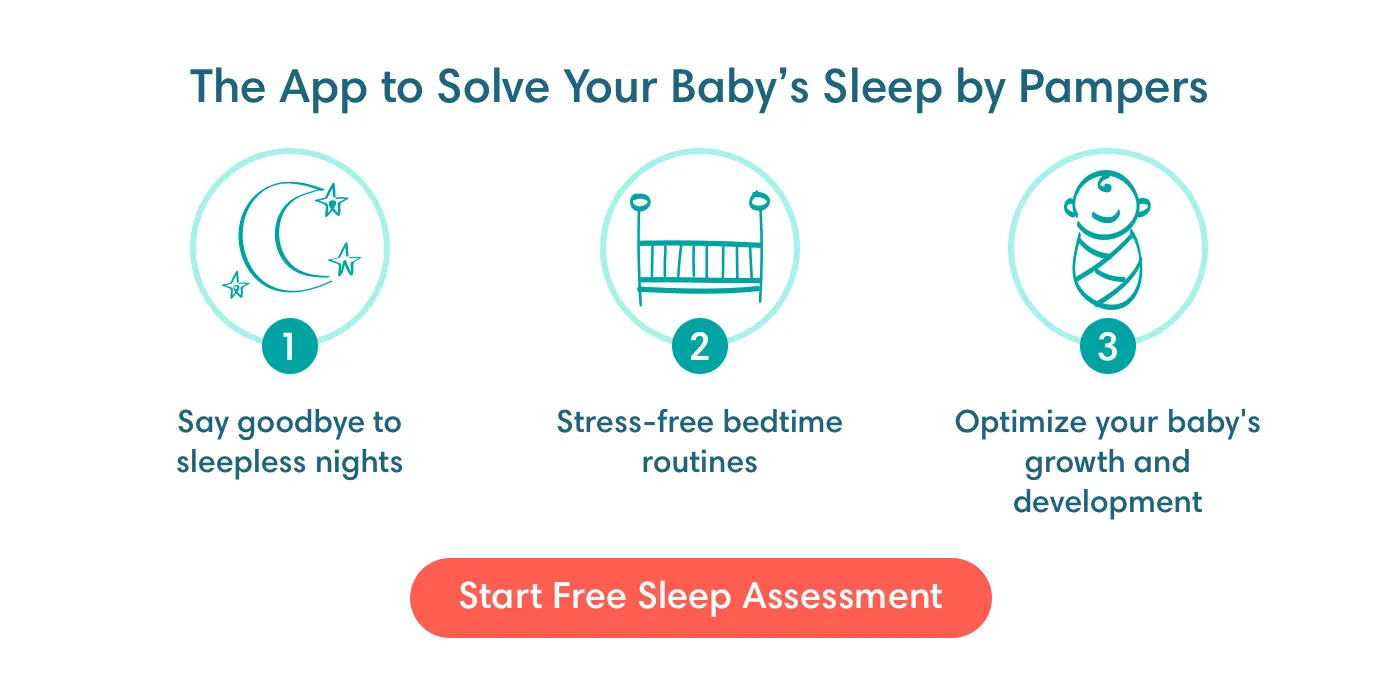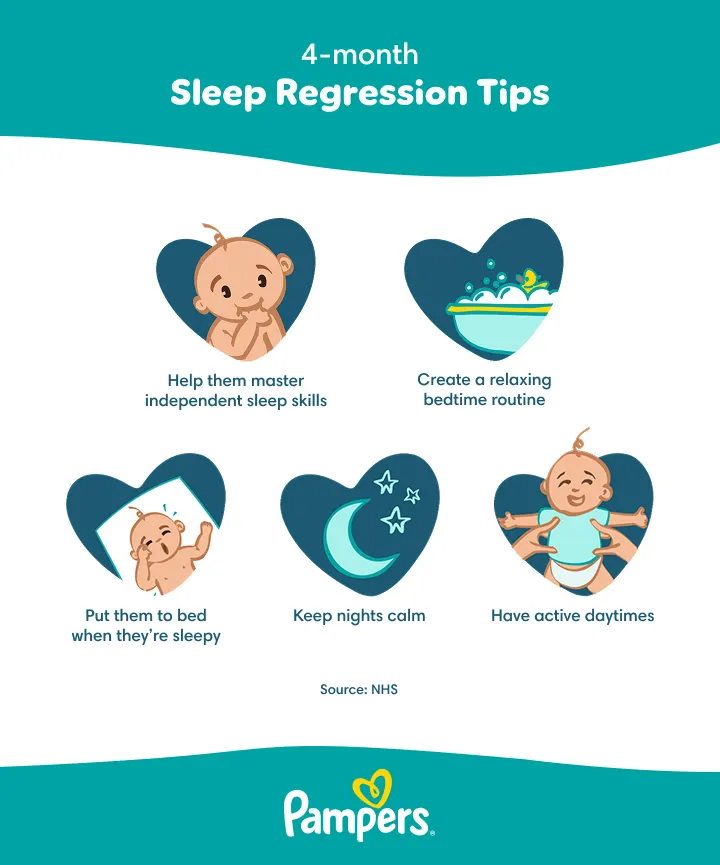
4-Month Sleep Regression: Causes, Signs & How to Manage It
Is your once-sleepy baby suddenly wide awake at night? If your 4-month-old was settling well but is now waking frequently during the night and struggling to fall back asleep, it might be what some call a 4-month sleep regression. It's a normal but frustrating part of infant development.
Key Takeaways
What is it?
The 4-month sleep regression is a normal part of your baby’s development, as their sleep patterns mature and become more fragmented, leading to more frequent awakenings and lighter sleep.
Why does it happen?
Common signs:
How long does it last? Typically, this settles within about 2–6 weeks, though the overall timeframe can extend if sleep routines remain unsettled.
Looking for relief from the 4-month sleep regression? Try these practical, expert-backed tips and simple steps to help you and your baby sleep more soundly from tonight.
What Is 4-Month Sleep Regression?
You may have thought that sleep deprivation was behind you, but now your 4-month-old has started waking multiple times during the night! If you’re wondering, ‘Why is my 4-month-old not sleeping? ’ and your GP has ruled out any medical concerns, your little one might be experiencing what is often called 4-month sleep regression.
A sleep regression is when your baby, who previously slept well, suddenly begins to struggle with sleep. They may find it difficult to settle at bedtime or cry for your attention when they wake during the night, unable to fall back to sleep on their own.
This sleep disruption often happens during a period of rapid growth or development in your baby. Around 4 months of age, their brain and body are going through significant changes – which is why a 4-month sleep regression is so common. However, every baby is unique, so while many experience this phase, others may not go through a 4-month sleep regression at all. Both are completely normal and part of your baby’s individual development journey.
One major change at this stage is the development of your little one’s sleep and wake cycle. What happens at this age is they get two new states of sleep in each sleep cycle – these new sleep states are much lighter, so they fully rouse between sleep cycles. For example, a baby who was previously able to sleep around 2-3 hours and then wake to feed may now wake every 45 minutes to an hour.
Do All Babies Experience a 4-Month Sleep Regression?
So, do all babies have sleep regression? Not necessarily. You may have heard a lot about the 4-month sleep regression, but not all babies go through it in the same way, or at all. Some sail through this phase with little disruption, while others may wake more often as their sleep patterns mature.
To help you deal with your little one’s sleep disruptions and keep track of their nap and sleep schedule, download the Smart Sleep Coach by Pampers app. Co-created by paediatricians and sleep experts, this app can help you establish a bedtime routine, support sleep training, and assist with managing sleep regression if it occurs.
What Causes 4-Month Sleep Regression?
Sleep regressions can happen at any age, but it’s particularly common at 4 months when your baby’s sleep cycle is maturing. In addition, they get two new states of sleep in each sleep cycle – these new sleep states are much lighter, so they fully rouse between sleep cycles. This can cause challenges at nap time and more frequent night wakings. This is a permanent change in sleep, and while some babies manage it just fine, others need a bit more help to get through it.
So, why does a 4-month sleep regression occur, what factors contribute to sleep issues, and why might your baby be restless at night?
Let’s explore some common causes.
In Summary
The term ‘4-month sleep regression’ refers to your 4-month-old baby not sleeping as well as they previously have been. They may have a difficult time falling asleep or going back to sleep when waking up at night. This might occur at any age, but it is common at 4 months.
Sleep regression at 4 months may be connected to factors such as:
When Does the 4-Month Sleep Regression Start?
Having outlined what sleep regressions are and why they happen, you might be wondering when they actually occur. For many parents, the first signs appear around the four-month mark. That’s typically when the four-month sleep regression begins, as a baby’s sleep cycles start to mature and resemble those of adults.
Research hasn’t identified a specific age at which sleep regressions occur in babies; they can happen at different times. The four-month milestone is a common time for disrupted sleep, driven by biological and developmental changes.
Signs of 4-Month Sleep Regression
The following changes in sleep habits might indicate that your 4-month-old is experiencing signs of 4-month sleep regression:
If you’ve noticed some of these signs in your little one, they may be going through a 4-month sleep regression. However, it’s worth keeping in mind that your baby might wake frequently or struggle to sleep for other reasons, such as teething or illness.
If you’re concerned about your baby’s sleep or suspect there may be an underlying issue, consult your GP for advice.
Can the 4-Month Sleep Regression Affect Naps?
Around the four-month mark, your baby’s daytime naps may shorten, become less predictable, or prove tougher to settle. If you’re wondering whether sleep regression affects naps, the answer is usually yes. Daytime sleep is often disrupted, along with nighttime wake-ups. This is a normal phase of your little one’s developing sleep pattern, and most families see improvements as they adjust to the new routine.
How Long Does a 4-Month Sleep Regression Last?
A sleep regression typically lasts 2-6 weeks. But even one sleepless night could feel overwhelming, and a week or two of disrupted sleep may make a full night’s rest seem like a distant dream. But you’re not alone – most parents have faced sleepless nights with their little ones.
So, when does the 4-month sleep regression end? The good news is that in most cases it will pass in just a couple of weeks. During this time, your baby is adjusting to their new sleep cycle and will likely start sleeping for longer stretches at night. By 8 to 9 months old, many babies begin sleeping through the night. That said, every child is unique and some may settle into a consistent sleep pattern sooner, while others may not experience a 4-month sleep regression at all.
Studies have shown that teaching and forming good sleep habits while your baby is young is easier compared to when they’re reaching toddlerhood. It just takes a little (or a lot) of time and patience – but better sleep is on the horizon!
Signs 4-Month Sleep Regression is Over
The 4-month sleep regression marks a brief period when your baby's sleep can feel unsettled as they navigate key developmental changes. The exact length varies from baby to baby, but for many families sleep tends to settle again after a few weeks.
As the 4-month sleep regression begins to ease, you may notice these telltale signs.
Tips for 4-Month Sleep Regression: How to Get Through It
There’s no ‘one-size-fits-all’ solution for 4-month sleep regression, but there are plenty of strategies you can try to support your baby’s sleep during this tricky phase. With time, patience and the following 4-month sleep regression tips, you and your little one may work through this stage and move towards more restful nights.
Help them master independent sleep skills
Help them master independent sleep skills
It can be tempting to always pick up, rock or cuddle your baby when they are sleepy and unsettled. While there is nothing wrong with providing plenty of hugs, it can be beneficial to help your 4-month-old learn independent sleep skills so they can fall asleep in their cot on their own. If your baby wakes up at night, it's best to avoid talking or playing with them. Instead, attend to their needs calmly and quietly, and aim to get them back to bed as quickly as possible.
Create a bedtime routine
Create a bedtime routine
A consistent bedtime routine may help your baby relax and establish healthy sleep habits. You might include calming activities like a warm bath, gentle rocking, a soothing massage, cuddling or a bedtime lullaby. A simple story before bed could also help your little one wind down and prepare for sleep.
Recognising the cues
Recognising the cues
Understanding when your baby is ready for bed may make a big difference. Aim to put them down when they’re sleepy but still awake. This encourages your baby to learn how to drift off independently. Common signs of sleepiness include yawning, rubbing eyes, pulling at ears or becoming fussy. Acting on these cues may support their ability to fall asleep on their own.
Feed before bedtime
Feed before bedtime
During a 4-month sleep regression, your baby is experiencing significant growth and development, which may increase their hunger levels. Ensuring they’re well-fed throughout the day and offering a feed right before bedtime may help minimise night-time wake-ups due to hunger. For more insights, check out this guide on when babies start sleeping through the night.
Keep nights calm and days active
Keep nights calm and days active
Create a calming bedtime environment by dimming the lights, speaking in soothing tones, and avoiding stimulating activities, toys or screentime in the evening. During the day, focus on keeping your baby active, exposing them to natural light, and engaging in playful interactions. This contrast between calm evenings and active days helps regulate their sleep-wake cycle and encourages a better night’s sleep.
Be gentle with yourself
Be gentle with yourself
Parenting is incredibly rewarding, but it can also be challenging. Remember to be as patient with yourself as you are with your baby as you encounter new challenges together. Growth brings change, and it’s a learning curve for both of you!
Whether you’re trying to figure out how to get through a 4-month sleep regression or simply hoping for one decent nap, know this: you’re not alone, and this stage will pass.
Sleep Training a 4-Month-Old
By around four months, many babies are ready to start learning how to master independent sleep skills with your support. If you're considering sleep training a four-month-old, it's helpful to understand the different approaches so you can pick the one that works best for you and your baby. Experts often advise waiting until your baby is at least 6 months old before attempting sleep training. From the outset, a calm, soothing bedtime routine is widely regarded as the most effective way to help you and your baby sleep well.
There are a few common approaches to sleep training for babies, each differing in how involved parents are and in their tolerance for crying.
Some babies respond well to gradual reassurance, while others might find it more upsetting. It’s all about finding what works for your little one’s temperament and your comfort. If you’re not sure how to begin or if sleep feels especially difficult, consult your baby’s GP or health visitor for guidance before starting any method.
Can You Prevent 4-Month Sleep Regression?
Sleep regressions are a normal stage in early infancy, and each baby may respond a little differently. Although you can’t completely prevent a 4-month sleep regression, you can make it easier by establishing a regular sleep routine, including consistent bedtimes, a calm wind-down and laying your little one down drowsy but awake.
When to Consult Your Baby’s GP or Health Visitor
Sleep disruptions or a 4-month sleep regression may occasionally be linked to sleep disorders or underlying health concerns. It’s important to consult your child’s GP if:
If you notice these symptoms or have concerns about your baby’s health, don’t hesitate to reach out to your GP for guidance.
Self-Care Tips for Tired Parents
Sleep regressions can take a toll on both you and your baby. As you do your best to support your little one, remember to look after yourself too. A few practical steps can help you navigate this demanding phase:
You’re not expected to do everything perfectly. Caring for your little one means caring for yourself, too. The more supported you feel, the more present you can be, one nap (or deep breath) at a time.
FAQS AT A GLANCE
As your baby’s sleep patterns mature, nights may become more unsettled. This stage is commonly known as the 4-month sleep regression, and it can bring more frequent awakenings and a tougher time settling down.
The Bottom Line
The arrival of a newborn often brings sleepless nights, but as your little one grows, they will begin sleeping longer stretches – or even through the night. Around 4 months, however, their sleep cycle starts maturing, which may temporarily disrupt their rest. This phase, known as a 4-month sleep regression, is a normal part of adjusting to new sleep patterns.
To help your baby sleep better, try encouraging independent sleep skills, establishing a calming bedtime routine and ensuring they’re well-fed before bed. With patience and consistency, peaceful nights are on the horizon!
Don’t forget to download the Pampers Club app to earn rewards on every pack of Pampers nappies, nappy pants and wipes – because your little one deserves the best!
- NCT. Toddler Sleep: How to Help with Any Problems.
- Great Ormond Street Hospital. ‘Central Sleep Apnoea Syndrome (CSA).’
- NHS. Colic.
- NHS. Helping Your Baby to Sleep.
- NHS. Reflux in Babies.
- Just One Norfolk. ‘Our Services: 3–4 Month Check.’
- Wirral Community Health and Care NHS Foundation Trust. ‘Safer Sleep 3–6 Months.’
- Wirral Community Health and Care NHS Foundation Trust. ‘Safer Sleep 6–12 Months.’





